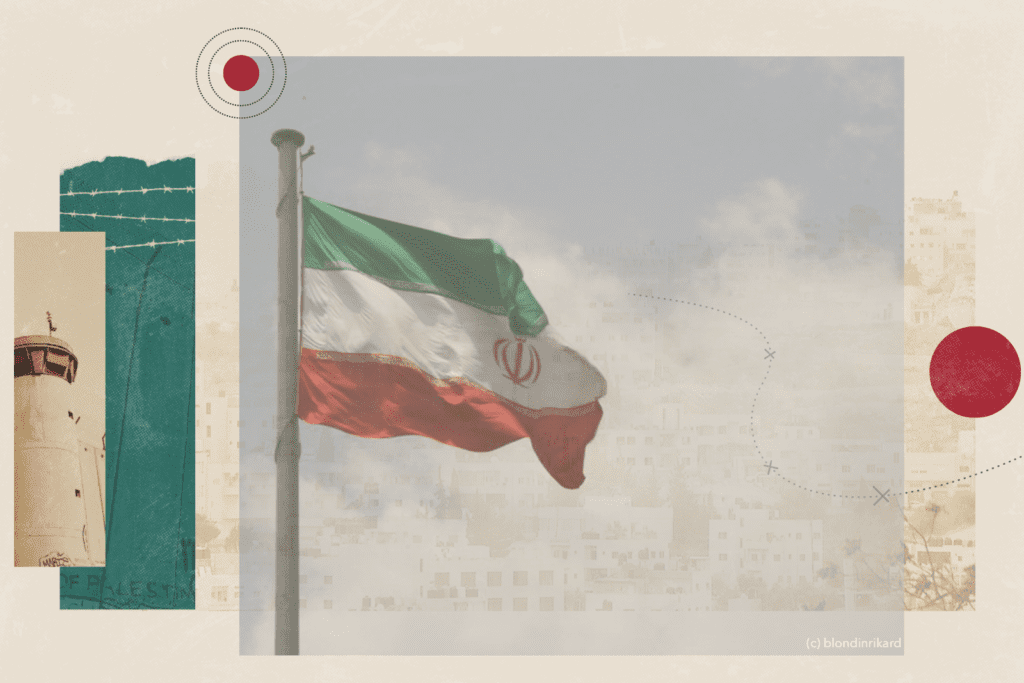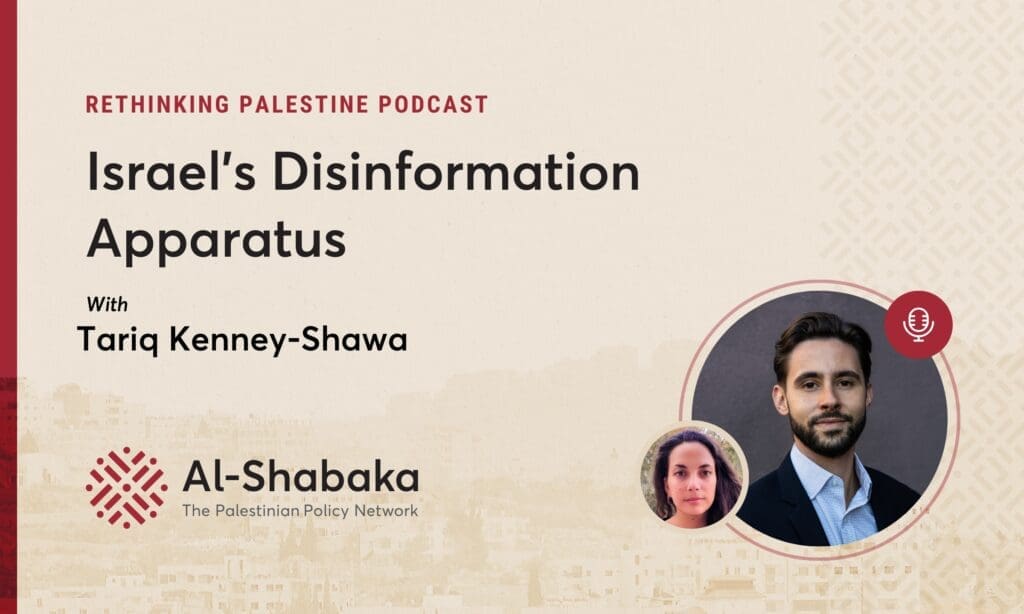- Topics
-
Topics
See our analysis on civil society and how it shapes culture, politics, and policies
Read our insights on the shifting political landscape and what it means for Palestine
Learn more about the policies and practices shaping the Palestinian economy
Strengthen your understanding of the unique conditions for Palestinian refugees across the Middle East
-
- Analysis
-
Analysis
In-depth analysis on existing or potential policies that impact possibilities for Palestinian liberation.
Insights and perspectives on social, political, and economic questions related to Palestine and Palestinians globally.
Concise analysis into a specific policy, its background and implications.
Commentary that brings together insights from multiple analysts.
Compilations of past Al-Shabaka works surrounding a specific theme.
Longer-form, ad hoc projects that seek to confront research questions outside the scope of our regular analysis.
A policy-driven research initiative by Al-Shabaka: The Palestinian Policy Network.
Our monthly webinar series that brings together Palestinian experts.
Featured
While it remains unclear how and when Israel will respond to Iran’s operation, geopolitics have undoubtedly already shifted. In this roundtable, Al-Shabaka analysts Fadi Quran, Fathi Nimer, Tariq Kenney-Shawa, and Yara Hawari offer insights on the regional impact of Iran’s recent maneuver and situate the ongoing genocide in Gaza within this broader context.


 +Mainstream media coverage of the genocide in Gaza throughout the West has highlighted not only deep biases in favor of the Israeli regime, but also the ease in which Palestinians are dehumanized. In this commentary, Yara Hawari details Israel’s strategy to strip Palestinians of their humanity in the public realm, as well as the role of Western media in advancing Israel’s aims. She reveals consistent patterns of journalistic malpractice since October 7, 2023, and concludes that the Western outlets are inescapably complicit in the Israeli regime’s genocide against the Palestinian people of Gaza.
+Mainstream media coverage of the genocide in Gaza throughout the West has highlighted not only deep biases in favor of the Israeli regime, but also the ease in which Palestinians are dehumanized. In this commentary, Yara Hawari details Israel’s strategy to strip Palestinians of their humanity in the public realm, as well as the role of Western media in advancing Israel’s aims. She reveals consistent patterns of journalistic malpractice since October 7, 2023, and concludes that the Western outlets are inescapably complicit in the Israeli regime’s genocide against the Palestinian people of Gaza. Yara Hawari· Apr 3, 2024Tariq Kenney-Shawa, Al-Shabaka’s US policy fellow, joins host Yara Hawari to discuss Israel’s information warfare tactics, used to influence public perception of its ongoing genocide in Gaza.
Yara Hawari· Apr 3, 2024Tariq Kenney-Shawa, Al-Shabaka’s US policy fellow, joins host Yara Hawari to discuss Israel’s information warfare tactics, used to influence public perception of its ongoing genocide in Gaza.
-
- Resources
- Media & Outreach
- The Network





How Can Palestinian Reconciliation Efforts Save the National Project?
The national reconciliation meeting that convened all Palestinian political factions in Cairo on November 21-22, 2017, concluded with a statement that referred to past reconciliation agreements and called for the activation of several committees, whose ability to produce meaningful results remains to be seen. True, the Palestinian Authority (PA) resumed its duties in the Gaza-based ministries as per the October agreement signed by Fatah and Hamas in Cairo under the watchful eye of Egyptian President Abdel Fattah el-Sisi, and Hamas has shown positive good will.
However, if anything, the Cairo meeting was a sign of the weakness of the Palestinian movement and its inability to deal with either internal or international pressures. Barring so far limited opening of the Rafah crossing by Egypt, there has been no appreciable improvement in the lives of the Palestinians in the Gaza Strip in terms of access to basic services like electricity, clean water and sanitation, health care, or reconstruction. To understand why it is so hard to achieve national unity, it is worth examining the intricacies of the issues that Fatah and Hamas must resolve, as well as Israel’s own objectives.
What Does Israel Want?
Israel believes the current attempt at reconciliation is doomed to fail like the 11 before it (whose failure it often helped to ensure). However, should this attempt succeed, Israel is waiting to see how the process will be implemented on the ground, and how it can manipulate it to serve its security interests. Israel wants to see the PA in full control of the Strip and apply the same policies it does in the West Bank, particularly with regard to security coordination and prevention of attacks against it.
In such a scenario, Israel would effectively regain ultimate security control over Gaza and avoid having to make concessions (albeit short lived) in exchange for a truce with Hamas, Islamic Jihad, and their allies. Control of the border crossings by the PA’s security forces would guarantee stability in adjacent Israeli settlements, prevent smuggling of weapons into Gaza, and could lead to a Palestinian effort to disarm the resistance groups.
Israel also knows that PA President Mahmoud Abbas will not allow Israeli prisoners to be held captive in the territories under his control. This could facilitate a breakthrough in the Hamas-Israel prisoner exchange being negotiated under Egyptian auspices, which would be a win for Israeli Prime Minister Benjamin Netanyahu. His government has been accused of indifference to the fate of the Israeli citizens held by Hamas as well as to the recovery of the bodies of two Israeli soldiers killed in the 2014 Israeli attack on Gaza.
Any reconciliation not on Israel’s terms will face serious difficulties Click To TweetIsrael’s position in a prisoner exchange has recently been strengthened by the fact that it now holds the bodies of five of the 12 Palestinians it killed in its end-October bombing of a tunnel east of Khan Younis under the wide “buffer zone” it has created along its border with Gaza. That attack was also intended to send an Israeli message to the Palestinians that any reconciliation agreement should deal with the issue of the tunnels.
Should the PA fail to disarm Hamas, Israel could freeze its relations with the PA at any time and cite the lack of a Palestinian partner for peace. It could even claim that the PA is complicit with Hamas. In short, any reconciliation not on Israel’s terms will face serious difficulties and will likely have to keep restarting from square one.
The Intricate Issues on the Reconciliation Agenda
Separately from the obstacles Israel would create, the issues that must be resolved by Fatah and Hamas to achieve reconciliation have only grown in complexity. They revolve around four main axes.
The first is the formation of a national unity government. Hamas is unlikely to comply with the conditions of the Quartet (the US, Russia, the European Union, and the United Nations) to recognize Israel, commit to nonviolence, and recognize past peace agreements. Some Palestinians fear that if Hamas insists on refusing the Quartet conditions, all Palestinians, not just those in Gaza, will come under renewed sanctions and siege.
Even assuming a best case scenario in which the international community and Israel are willing to turn a blind eye to Hamas’ participation in a unity government, especially if such a government includes figures who are close to but not members of Hamas, there is a risk of establishing a dual Fatah-Hamas system of governing institutions that would exclude independent Palestinian experts and other factions. In a recent Al-Shabaka policy memo Khalil Shaheen warns of the pitfalls of such a regime and the risk of reviving discord over government operations.
Real PLO reform is achieved by reforming its structure and ensuring participation of all Palestinians Click To TweetIt is worth noting another twist introduced in the statement of the just-concluded Cairo meeting, which stipulated that all would be done with full respect of the law. However, many of the laws Hamas passed and the systems it put in place during the 10-year period of division violate the law. This will be a difficult circle to square.
The holding of elections is the second major block to reconciliation though it is high on the agenda of the agreement. Hamas has not yet forgotten its experience of winning the legislative elections in 2006 yet being denied the right to exercise its powers. Indeed, several Hamas legislators incarcerated immediately after the elections remain captive in Israel’s prisons. Hamas’ participation in any elections is likely to require guarantees by the PA and the international community to recognize the results regardless of who wins. Yet having faith in such guarantees would be a challenge given that the Fatah-controlled PA would be betting on Hamas’ electoral defeat.
The reform of the Palestine Liberation Organization (PLO) is the third stumbling block. The Document of General Principles and Policies announced by the former chief of Hamas’ Political Bureau, Khaled Meshal, in Doha last May set out a positive position toward the PLO. However, Hamas insists on maintaining its position of rejection of Oslo, its right to resist occupation by all means, and its refusal of security coordination with Israel. It also believes that, within the PLO, Fatah has monopolized Palestinian decision making since the organization’s inception.
Regardless, real PLO reform is not achieved by including Hamas and Islamic Jihad, but by reforming the organization’s structure and ensuring the full participation of all Palestinians in Palestine and abroad in the decision making process. Real reforms also demand a participatory political program to prevent monopoly over fateful decisions and an inclusive leadership to replace the traditional leadership that impedes reforms.
Palestinians need not only end the division, but also protect the Palestinian national project Click To TweetLast but not least is the question of armed resistance. The PA refuses the existence of any arms that are not under its control and rejects the model of having a resistance movement within a state, as in the case of Lebanon’s Hezbollah. By contrast Hamas views its arms as a tool for liberation and refuses to disarm before achieving liberation and establishing a Palestinian state. This issue will be an obstacle to reconciliation if no agreed formula is found.
How to Protect the National Project
The Palestinian cause is at a critical juncture because of regional and international developments. The main disagreement between the different parties is largely over the political program rather than power sharing and government, even though neither program has achieved Palestinian rights. It is vital to reach consensus on a joint political program on which to base a fully inclusive national agreement. Some proposals are made below.
Israel’s occupation regime benefits from and exploits Palestinian divisions to further oppress the Palestinian people and evade any commitment to peace. To confront the occupation and restore Palestinian agency in the struggle for the right to self-determination, freedom and independence, and a sovereign independent state with Jerusalem as its capital, Palestinians need not only to end the division, but also to protect the Palestinian national project. There are serious Israeli and American attempts, together with some Arab states, to impose regional solutions or an “economic peace.”
The current efforts to unify the political system and Palestinian government institutions are important first steps to end the division. Both parties must come to believe that the division cannot continue, that the dangers facing the national cause are real, and that the Palestinian people refuse hegemony and oppression. They must press on with the resolution of the remaining issues, difficult as they are.
Wajjeh Abu Zarifa
Latest Analysis
Palestinian Perspectives on Escalating Iran-Israel Relations
The Gaza Genocide in Western Media: Culprits of Complicity
Israel’s Disinformation Apparatus: A Key Weapon in its Arsenal
We’re building a network for liberation.
As the only global Palestinian think tank, we’re working hard to respond to rapid developments affecting Palestinians, while remaining committed to shedding light on issues that may otherwise be overlooked.